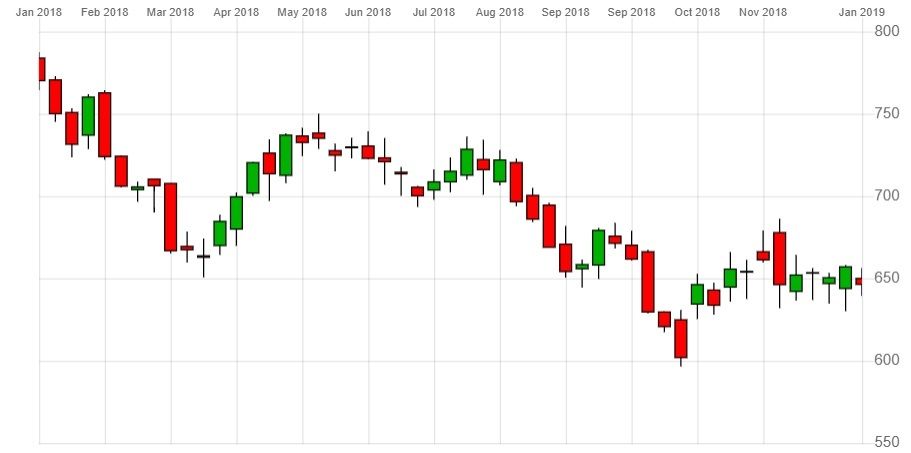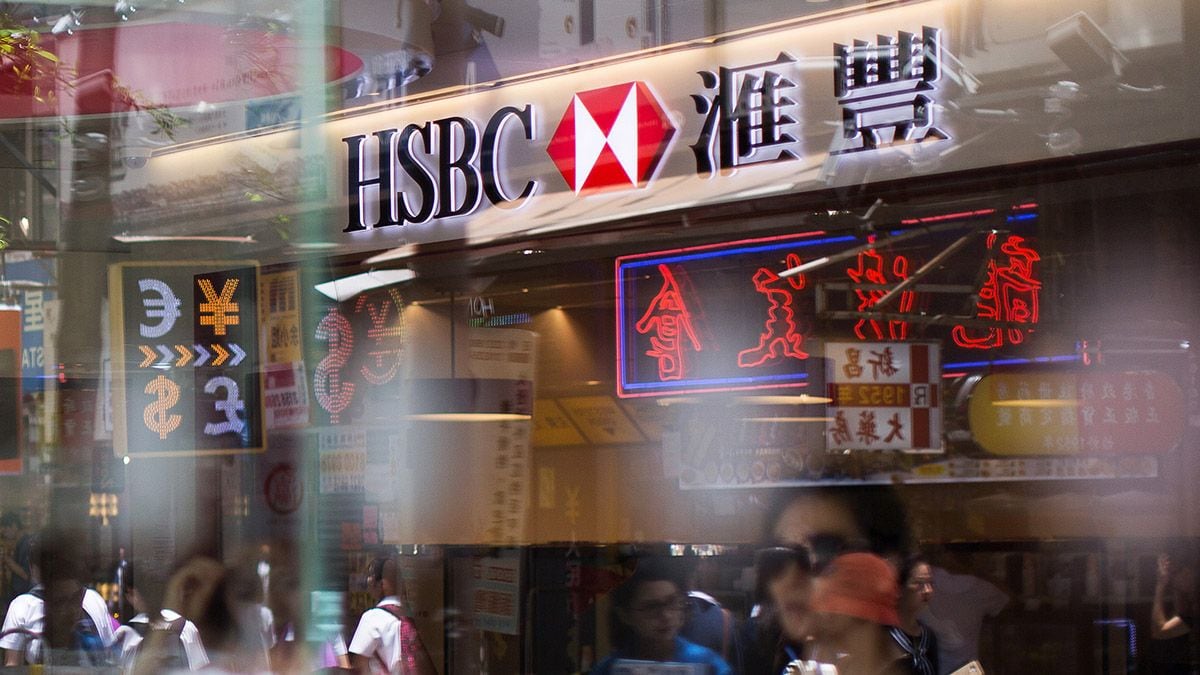HSBC Holdings [HSBA] has been a bank in transition over the last year as its long-serving leader, chief executive Stuart Gulliver, stepped down in February 2018, making way for John Flint to take the helm as executive director and group chief executive.
Since taking over, Flint has made it his mission to return the bank to growth by realigning its core revenue generation, however its stock has experienced an adjustment in the process.
Through 2018, HSBC’s stock underperformed the FTSE 100 with its share price falling by more than 14.5% compared to the UK index’s 12.6% loss.
The stock has meanwhile had a choppy start in 2019, gaining 1.2% on 4 January, before losing the same amount on the following day of trading.
Looking at the trailing 12-month price change since the stock hit a 2018 high on 11 January, it is down more than 18%. HSBC currently has a dividend yield of 6% and a P/E ratio of 12.2 which, compared to the UK banking sector’s average P/E ratio of 25.16, could offer a margin of safety.
While the bank intends to sustain dividends at current levels, equating to a forward annual dividend yield of 4.88%, HSBC’s $2.6tn balance sheet, world-leading trade finance franchise and dominant position in the Hong Kong market could serve long-term investors well.
In addition, Flint said the bank is expecting a return on tangible equity of more than 11% by 2020.
So far this year, the bank has had its stock rated as neutral by Citigroup and UBS, although UBS did reaffirm its preference for UK-focused lenders over Asia-focused HSBC due to downside risks, including income and cost headwinds.
| Pre-tax profit % change, Q3 YoY | +28% |
| Market cap | £127.87bn |
| PE Ratio (TTM) | 12.02 |
| EPS (TTM) | 53.10 |
HSBC stock vitals, Yahoo finance, as at 15 January 2019
Banking on Asia
As one of the world’s largest banks, HSBC’s pivot to focus its business in Asia still raises a number of risks.
As well as the US-China trade war that is hurting Asian markets, rising US interest rates have hurt the performance of emerging economies that borrowed against the dollar heavily during periods of low rates.
But despite a slowing Chinese economy, growth is still there: the Asian economy as a whole could experience rapid wage growth in the coming years, which would fuel demand for banking products and services.
With 75% of the bank’s total profits coming from its Asia businesses – it reported $13.83bn in profit for the nine months ending 30 September with its European businesses reporting only a $7.5bn profit – HSBC’s exposure to risk could reduce investor and trader sentiment.
“In a world of tit-for-tat sanctions between the global powers, it could become harder for HSBC to benefit from its deep Asian roots,” Steve Clayton, a fund manager at Hargreaves Lansdown, said.
75%
Percentage of HSBC's total profit from Asia businesses
A global strategy
As part of its two-part business strategy to expand its international presence, the bank has reached a global network that covers 90% of global GDP, trade and capital flows, and has increased its revenue from global markets by 4% to $12.4bn in 2018.
HSBC’s latest development has been the opening of its new United Arab Emirates headquarters, which is just one of eight scale markets that includes the UK and Hong Kong, its biggest market.
And ahead of Britain’s exit from the EU, the bank has implemented changes to the way it operates in the UK. In August last year, HSBC revealed it had shifted ownership of its Polish and Irish subsidiaries from London to France with plans to do the same for seven other European subsidiaries.
On the mend
After a period of restructuring following a year of big fines and hasty acquisitions, HSBC’s current strategy is to invest $15-17bn in growth and technology to bolster its growth areas over the next two years.
So far, the bank has had a strong end to 2018 in regards to financials, delivering a surge of 9% in revenues year on year. This was combined with a 6.8% fall in operating expenses, which helped to generate profits of $4.2bn for the quarter.
While HSBC currently holds a trailing 12-month growth of 735%, due to poor performance across 2017 and the beginning of 2018, for trailing five years the EPS growth rate is -5.8%. It currently has an EPS of 2.67. Sales are down 3.35% and 6.28% for the past year and five years respectively.
-5.8%
HSBC EPS growth rate for trailing five years
The bank is expected to release its annual results for 2018 on 19 February. Some analysts have predicted a rise in net profit of about 5% as investment in its growth strategy begins to pay off.
Although HSBC may not be performing as well as some of its FTSE 100 peers, it has a solid strategy in place that bolsters diversity and improves operating conditions by reducing costs, as well as a relatively low valuation compared to the wider sector.
Disclaimer Past performance is not a reliable indicator of future results.
CMC Markets is an execution-only service provider. The material (whether or not it states any opinions) is for general information purposes only, and does not take into account your personal circumstances or objectives. Nothing in this material is (or should be considered to be) financial, investment or other advice on which reliance should be placed. No opinion given in the material constitutes a recommendation by CMC Markets or the author that any particular investment, security, transaction or investment strategy is suitable for any specific person.
The material has not been prepared in accordance with legal requirements designed to promote the independence of investment research. Although we are not specifically prevented from dealing before providing this material, we do not seek to take advantage of the material prior to its dissemination.
CMC Markets does not endorse or offer opinion on the trading strategies used by the author. Their trading strategies do not guarantee any return and CMC Markets shall not be held responsible for any loss that you may incur, either directly or indirectly, arising from any investment based on any information contained herein.
*Tax treatment depends on individual circumstances and can change or may differ in a jurisdiction other than the UK.
Continue reading for FREE
- Includes free newsletter updates, unsubscribe anytime. Privacy policy





